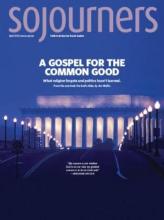THE CHURCH IS locked in a polarized debate around same-sex relationships that is creating painful divisions, subverting the church's missional intent, and damaging the credibility of its witness. We've all heard the sound-bite arguments. For some, condoning or blessing same-sex relationships betrays the clear teaching of the Bible, and represents a capitulation to the self-gratifying, permissive sexual ethic of a secularized culture. For others, affirming same-sex relationships flows from the command to love our neighbor, embodies the love of Jesus, and honors the spiritual integrity and experience of gay and lesbian brothers and sisters.
The way the debate presently is framed makes productive dialogue difficult. People talk past one another. Biblical texts collide with the testimony of human experience. The stakes of the debate become elevated from a difference around ethical discernment to the preservation of the gospel's integrity—for both sides. Lines get drawn in the ecclesiastical sand. Some decide that to be "pure" they must separate themselves spiritually from others and break the fellowship of Christ's body. Then the debate devolves into public wrangling over judicial proceedings, constitutional interpretations, and property ownership. Meanwhile, the "nones," those who are walking away from any active relig-ious faith, find further confirmation for their growing estrangement.
Mirroring the dynamics of contemporary secular politics, the debate is driven by small but vocal minorities with uncompromising positions at one end or another of the spectrum. For the majority in the middle, who may be unclear about their own understandings, exploring their questions is made difficult because of the polarized toxicity of the debate. Further, those in positions of leadership in congregations or denominations come to regard the controversy over same-sex relationships as the "third rail" of church politics. They don't want to touch it. I know this because I've been there myself.
Read the Full Article
